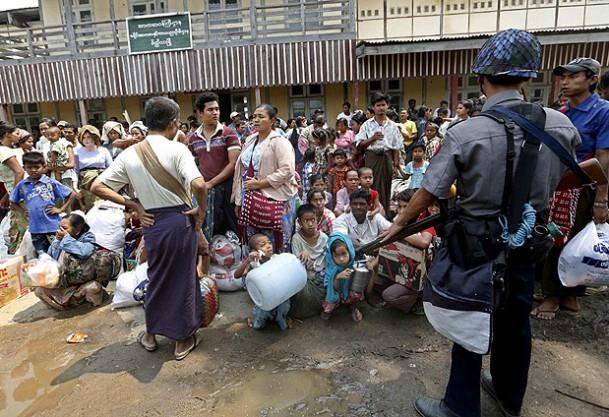UN Presses Myanmar over Rohingya Rights

A resolution passed the U.N. General Assembly committee dealing with human rights welcomed positive steps in political and economic reform in Myanmar but reiterated serious concerns about violence and other discrimination against the Rohingya Muslim minority.
It urged the government to speed up efforts to address abuses against all ethnic and religious minorities and called for the release of remaining political prisoners.
The resolution also urged authorities to continue constitutional reform "to ensure, inter alia, that the elections to be held in 2015 are credible, inclusive and transparent, allowing all candidates to fairly contest the elections."
The resolution came days after the speaker of Myanmar's parliament said the constitution could not be changed until after next year's general election, casting doubt on the chances of Nobel laureate Aung San Suu Kyi becoming president and the military's political power being weakened.
The current constitution guarantees a 25 percent parliamentary quota for the military that ruled Myanmar with an iron fist for 49 years, while Suu Kyi would be barred from office because her late husband was a foreigner.
Critics say Myanmar's reforms have stalled and the military is reasserting itself after several years of astonishing change following a shift from military rule to a semi-civilian system.
Prejudice against the Muslim minority known as Rohingyas is widespread and many have no right to citizenship.
The United Nations resolution urging Myanmar to grant citizenship to its Rohingya Muslim minority, ramping up pressure on Yangon to scrap a controversial identity plan.
The measure was adopted by consensus in the General Assembly's rights committee following some wrangling with countries from the 57-nation Organisation of Islamic Cooperation (OIC), which had sought stronger language. The resolution expresses "serious concern" over the plight of the Rohingya in Rakhine state.
Under a controversial government-backed plan, the Rohingya would be forced to identify themselves as Bengali - a term seen as disparaging - in order to apply for citizenship. Those who refuse would be forced to live in camps. Many in Myanmar's government and local Buddhists view Rohingya as illegal immigrants from neighboring Bangladesh, but the community maintains it has ancestral roots in the country.
The resolution urges the government to protect the rights of all inhabitants of Rakhine state and allow "equal access to full citizenship for the Rohingya minority," to "allow self-identification" and ensure equal access to services.
Violent clashes by ethnic Buddhists against Rohingyas in the western state of Rakhine last year killed hundreds of Rohingya and left 140,000 homeless.
According to the Arakan Project, which plots migration across the Bay of Bengal, about 100,000 Rohingya have fled Rakhine since 2012, including thousands in recent weeks.
On Thursday, Myanmar President Thein Sein denied Rohingya were fleeing "torture" in Rakhine, telling the Voice of America Burmese Service such media reports were fabrications and international concern overblown.
Earlier this month, U.S. President Barack Obama, on a visit to Myanmar, called on the government to grant the Rohingya equal rights.
Source: World Bulletin



